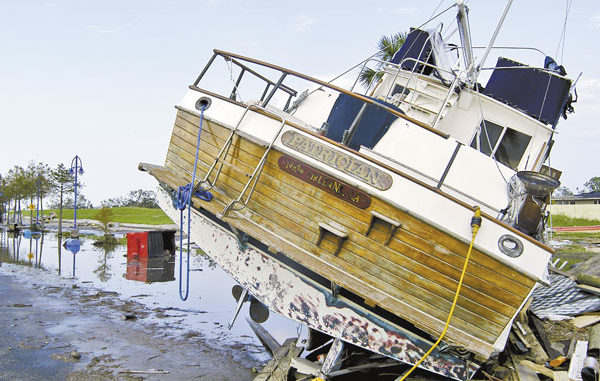
We are approaching the middle of another hurricane season. Have you finalized your plans in case a storm comes your way? Did you include your boat in that plan?
Each year storms destroy a lot of boats. It doesn’t have to be that way. Proper planning and precautions could help prevent the unthinkable from happening to your boat.
If your boat must remain in the path of the storm, prepare it in much the same way as you would your house. If possible, store the boat in a secured location such as a warehouse or sturdy garage.
For any boats that will remain outside, remove all loose gear from the boat. Storage covers and convertible tops should be taken down, folded and secured so that the wind does not tear them up. High winds can cause canvas covers to tear apart. The loose ends of that canvas will then be whipped by the wind and can cause damage to other parts of your boat such as windshield or upholstery.
Store all your loose gear in a closed compartment in the boat or move it to a secure area inside your house or garage. Check the boat’s bilge area and especially the drain plug hole at the transom. Dirt and leaves can block the drain plug hole and cause the boat to fill with rain water. If you get enough water in the boat the excess weight (8 pounds per gallon) could cause your trailer to collapse.
Disconnect the battery cables in order to avoid the possibility of electrical short should the water level in the boat cover the top of the battery.
Choose carefully where you park your boat if it is going to remain exposed to the weather. During Katrina, one of my neighbors parked his boat on a section of his yard that was higher than the surrounding ground. He felt that if there were any flooding the boat would be safer there. He did not take into consideration the large oak tree that was also on that portion of ground. Katrina spared the oak tree but it did cause one of the large tree branches to snap, and it crushed both the boat and trailer.
If you plan to evacuate when a storm approaches, you might consider taking your boat with you. Like any road trip, you will need to thoroughly prepare your rig for the journey, and you should start making those preparations now before the next storm threatens.
Carefully inspect the trailer undercarriage. First check the springs. Are they beginning to flatten out or do they have excessive amounts of rust on them? This could be signs of danger, and the springs should be replaced.
Check your trailer tires both for proper air-pressure inflation as well as for any signs of dry rot or excessive wear. Tires that have cracking on the sidewalls are beginning to rot, and should be changed before going on any extended road travel.
Trailer bearings are an absolute must for your check list. Jack up the trailer tires and try to shake them from side to side. Spin the tire and listen closely to the trailer hub for any grinding noises. Inspect the inside of the trailer tire and hub for any signs of grease leaking from the rear seal.
If any of these three things occur, you will need to remove the trailer hubs, clean and inspect the bearings, and replace them if needed. Repack the bearings and install new hub seals before installing the hubs back on the axle.
There will be many other evacuees on the road with you so pay extra attention to your trailer lights. Don’t just plug in your lights and test the lights in your driveway. Take the time to thoroughly inspect the entire wiring system for your trailer. Start at the front and work your way all the way to the lights in the rear. Check for any indications of wires being pinched or the insulation cut or skinned away as this can cause a short circuit, which will blow fuses on your tow vehicle and the lights will not work.
Don’t forget to check your boat tie downs both front and rear. Towing your boat without proper tie downs is like driving your car without wearing a seatbelt.
During this time of year, it is important to keep your boat in a state of readiness. Always keep the gas tank topped off and an extra supply of outboard motor oil stashed on board. The battery should be fully charged and the motor ready to crank on a moment’s notice.
Run your engine on the garden hose at least once or twice a month to verify that everything is operational.
It is also a good idea to keep the boat supplied with the necessary safety gear, first aid kit, bottled water, insect repellent, sunscreen and a stash of nonperishable food items. If you do get caught off guard, your boat could become a welcomed lifeline.
Be safe, be prepared, make a plan and hope and pray you never have to use it. If you have any questions about your boat, motor or trailer, you can e-mail me at theboatdr@yahoo.com.


